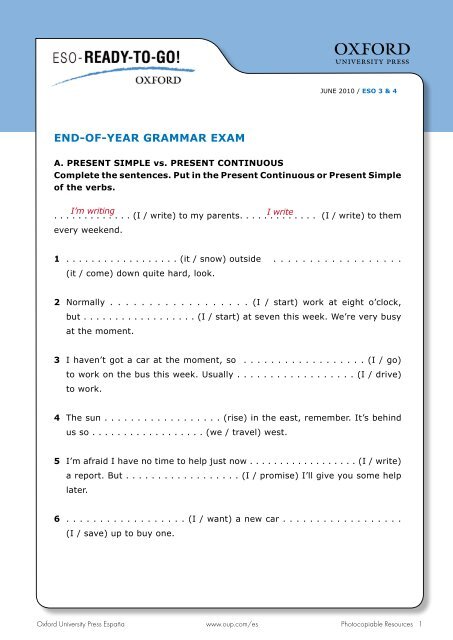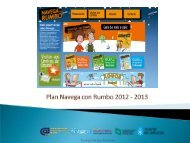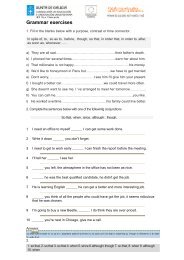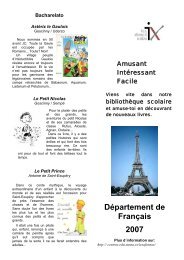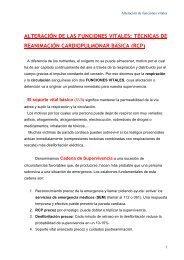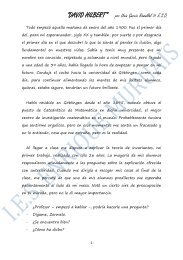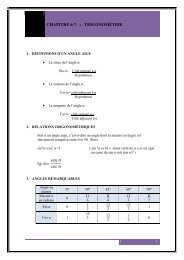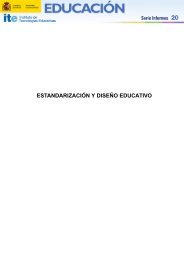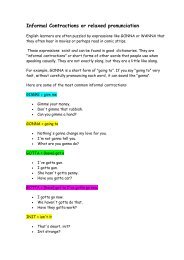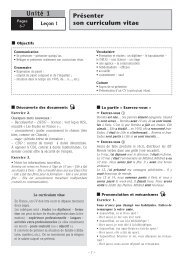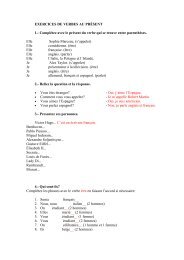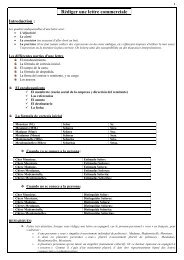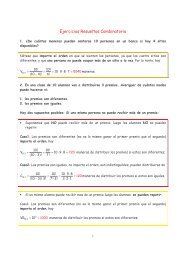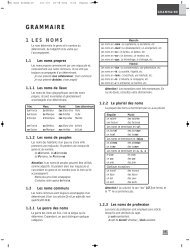END-OF-YEAR GRAMMAR EXAM
END-OF-YEAR GRAMMAR EXAM
END-OF-YEAR GRAMMAR EXAM
You also want an ePaper? Increase the reach of your titles
YUMPU automatically turns print PDFs into web optimized ePapers that Google loves.
1<br />
JUNE 2010 / ESO 3 & 4<br />
<strong>END</strong>-<strong>OF</strong>-<strong>YEAR</strong> <strong>GRAMMAR</strong> <strong>EXAM</strong><br />
A. PRESENT SIMPLE vs. PRESENT CONTINUOUS<br />
Complete the sentences. Put in the Present Continuous or Present Simple<br />
of the verbs.<br />
I’m writing<br />
. . . . . . . . . . . . . (I / write) to my parents. . . . .<br />
I<br />
.<br />
write<br />
. . . . . . . (I / write) to them<br />
every weekend.<br />
1 . . . . . . . . . . . . . . . . . . (it / snow) outside . . . . . . . . . . . . . . . . . .<br />
(it / come) down quite hard, look.<br />
2 Normally . . . . . . . . . . . . . . . . . . (I / start) work at eight o’clock,<br />
but . . . . . . . . . . . . . . . . . . (I / start) at seven this week. We’re very busy<br />
at the moment.<br />
3 I haven’t got a car at the moment, so . . . . . . . . . . . . . . . . . . (I / go)<br />
to work on the bus this week. Usually . . . . . . . . . . . . . . . . . . (I / drive)<br />
to work.<br />
4 The sun . . . . . . . . . . . . . . . . . . (rise) in the east, remember. It’s behind<br />
us so . . . . . . . . . . . . . . . . . . (we / travel) west.<br />
5 I’m afraid I have no time to help just now . . . . . . . . . . . . . . . . . . (I / write)<br />
a report. But . . . . . . . . . . . . . . . . . . (I / promise) I’ll give you some help<br />
later.<br />
6 . . . . . . . . . . . . . . . . . . (I / want) a new car . . . . . . . . . . . . . . . . . .<br />
(I / save) up to buy one.<br />
Oxford University Press España www.oup.com/es Photocopiable Resources 1
1<br />
JUNE 2010 / ESO 3 & 4<br />
B. PAST SIMPLE vs. PAST CONTINUOUS<br />
David is always having accidents. His girlfriend Melanie is talking<br />
about some of the accidents. Write her sentences from these notes.<br />
Each sentence has one verb in the Past Continuous and one in the Past<br />
Simple.<br />
when / he / carry / a suitcase / he / drop / it / on his foot<br />
......................................................<br />
When he was carrying a suitcase, he dropped it on his foot.<br />
he / break / his leg / when / he / ski<br />
......................................................<br />
He broke his leg when he was skiing<br />
1 he / sit down / on a chair / while / I / paint / it<br />
......................................................<br />
2 as / he / run / for a bus / he / collide / with a lamppost<br />
......................................................<br />
3 his hair / catch / fire / when / he / cook / chips<br />
......................................................<br />
4 when / he / hold / a beautiful vase / he / suddenly / drop / it<br />
......................................................<br />
5 he / sit / in the garden / when / a wasp / sting / him / on the nose<br />
......................................................<br />
Oxford University Press España www.oup.com/es Photocopiable Resources 2
1<br />
JUNE 2010 / ESO 3 & 4<br />
C. PRESENT PERFECT<br />
Decide which word is correct.<br />
I’d like to borrow this book. Has Anna read it . . . . . . . . . yet . . . . . . . . . ?<br />
a) done b) for c) just d) yet<br />
1 Ben writes very quickly. He’s . . . . . . . . . . . . . . . . . . finished his essay.<br />
a) already b) been c) for d) yet<br />
2 What are you going to do? ~ I don’t know. I haven’t decided . . . . . . . . . .<br />
a) just b) long c) since d) yet<br />
3 I’ve . . . . . . . . . . . . . . . . . . to London. I went there in June.<br />
a) been b) gone c) just d) yet<br />
4 Have you . . . . . . . . . . . . . . . . . . done any skiing?<br />
a) ever b) for c) just d) long<br />
5 My boyfriend hasn’t rung . . . . . . . . . . . . . . . . . . week.<br />
a) for b) last c) since d) this<br />
6 I haven’t seen that coat before. How . . . . . . . . . . . . . . . . . . . have you<br />
had it?<br />
a) already b) for c) long d) since<br />
7 The girls have . . . . . . . . . . . . . . . . . . to the cinema. They won’t be back<br />
until ten o’clock.<br />
a) already b) been c) gone d) just<br />
Oxford University Press España www.oup.com/es Photocopiable Resources 3
1<br />
JUNE 2010 / ESO 3 & 4<br />
8 I haven’t seen my parents . . . . . . . . . . . . . . . . . . last Christmas.<br />
a) already b) before c) for d) since<br />
9 This is the first . . . . . . . . . . . . . . . . . . I’ve ever lived away from home.<br />
a) already b) since c) that d) time<br />
10 This programme must be new. I’ve . . . . . . . . . . . . . . . . . seen it before.<br />
a) ever b) never c) since d) yet<br />
D. PAST SIMPLE vs. PRESENT PERFECT<br />
Put in the Present Perfect or Past Simple of the verbs in brackets.<br />
I . . . . ‘ve . . had . . . . . . . (have) these shoes since my eighteenth birthday.<br />
I . . . . . tidied . . . . . . . . (tidy) my desk, but now it’s in a mess again.<br />
1 The last time I . . . . . . . . . . . . . . (go) to Brighton was in August.<br />
2 I’d like to meet a ghost, but I . . . . . . . . . . . . . . (never / see) one.<br />
3 I’ve finished my homework. I . . . . . . . . . . . . . . (do) it before tea.<br />
4 And the race is over! And Micky Simpson . . . . . . . . .(win) in a record<br />
time!<br />
5 I . . . . . . . . . . . . . . (work) for a computer company for a year. That was<br />
after college.<br />
6 What time . . . . . . . . . . . . . . (you / get) to work this morning?<br />
Oxford University Press España www.oup.com/es Photocopiable Resources 4
1<br />
JUNE 2010 / ESO 3 & 4<br />
7 Martin . . . . . . . . . . . . . . (be) to Greece five times. He loves the place.<br />
8 The President . . . . . . . . . . . . . . (come) out of the building and is going to<br />
make a speech.<br />
9 You won’t believe this, but I’ve got some tickets for the concert. ~ Oh, well<br />
done. How . . . . . . . . . . . . . . (you / get) them?<br />
10 Of course I can ride a bike. But I . . . . . . . . . . . . . . (not / ride) one<br />
for years.<br />
11 Marilyn Monroe . . . . . . . . . . . . . . (be) in about thirty films.<br />
12 . . . . . . . . . . . . . . (you / ever / bake) your own bread? ~ No, but I might<br />
try it some time.<br />
13 Janet . . . . . . . . . . . . . . (be) very ill three years ago.<br />
14 Rupert has left a message for you. He . . . . . . . . . . . . . . (ring) last<br />
night.<br />
15 . . . . . . . . . . . . . . (you / see) the news today? ~ No, not yet. I’ll watch it<br />
at ten.<br />
16 We moved here in 1993. We . . . . . . . . . . . . . . (be) here a long time<br />
now.<br />
Oxford University Press España www.oup.com/es Photocopiable Resources 5
1<br />
JUNE 2010 / ESO 3 & 4<br />
E. FUTURE<br />
Read the telephone conversation. Then look at the answers below and<br />
write the correct answer in each space.<br />
Amy:<br />
When . . . .<br />
will<br />
. . .<br />
(d)<br />
. . . . . . I see you again?<br />
Simon: I don’t know. I’m (1) . . . . . . . . . . . . . to be busy this week. And I’ll<br />
(2) . . . . . . . . . . . . . going to London on Saturday.<br />
Amy:<br />
Oh. But you (3) . . . . . . . . . . . . . be here for my party, won’t you?<br />
Simon: No, I (4) . . . . . . . . . . . . . get back until Sunday evening.<br />
Amy:<br />
I (5) . . . . . . . . . . . . . going to invite you.<br />
Simon: Well, I’m sorry I can’t come.<br />
Amy:<br />
What (6) . . . . . . . . . . . . . you doing in London?<br />
Simon: Oh, I’m just going (7) . . . . . . . . . . . . . see one or two people. Look,<br />
I must go. I’m cooking something that I think is (8) . . . . . . . . . . . . .<br />
to boil over.<br />
a) am b) do c) going d) will<br />
1 a) being b) going c) shall d) will<br />
2 a) be b) do c) for d) to<br />
3 a) are b) do c) was d) will<br />
4 a) about b) aren’t c) be d) don’t<br />
5 a) be b) have c) was d) will<br />
6 a) are b) going c) to d) will<br />
7 a) be b) for c) is d) to<br />
8 a) about b) might c) probably d) will<br />
Oxford University Press España www.oup.com/es Photocopiable Resources 6
1<br />
JUNE 2010 / ESO 3 & 4<br />
F. PASSIVE VOICE<br />
Rewrite these sentences beginning with the underlined words.<br />
A woman was robbed.<br />
Thieves robbed a woman. . . . . . . . . . . . . . . . . . . . . . . . . . . . . .<br />
1 They may ban the film.<br />
......................................................<br />
2 They offered Nancy a pay increase.<br />
......................................................<br />
3 We need to correct the mistakes.<br />
......................................................<br />
4 Someone reported that the situation was under control.<br />
......................................................<br />
5 They are testing the new drug.<br />
......................................................<br />
6 We haven’t used the machine for ages.<br />
......................................................<br />
Oxford University Press España www.oup.com/es Photocopiable Resources 7
1<br />
JUNE 2010 / ESO 3 & 4<br />
G. COMPARATIVE AND SUPERLATIVE FORMS<br />
Write the correct forms.<br />
You’re the luckyest person I know . . . . . . .<br />
the<br />
. .<br />
luckiest<br />
. . . . . . . . . . . .<br />
he situation is getting difficulter . . . . . . .<br />
more<br />
. . . .<br />
difficult<br />
. . . . . . . . . . .<br />
1 I was happyer in my old job .................................<br />
2 I’ve got the most small office ................................<br />
3 This photo is the goodest ...................................<br />
4 Last week’s meeting was more short ...........................<br />
5 Money is the importantest thing ..............................<br />
6 Is Rachel elder than Vicky? ..................................<br />
7 This game is excitinger than the last one. ........................<br />
8 Of all the students, Andrew does the more work ...................<br />
9 This month has been weter than last month ......................<br />
10 The prices are more low here. ...............................<br />
11 I feel more bad than I did yesterday. ..........................<br />
Oxford University Press España www.oup.com/es Photocopiable Resources 8
1<br />
JUNE 2010 / ESO 3 & 4<br />
H. RELATIVE CLAUSES<br />
Put in the relative clauses. Sometimes there is more than one possible<br />
answer.<br />
Someone knows all about it – the secretary.<br />
who knows all about it<br />
The person . . . . . . . . . . . . . . . . . . . . . is the secretary.<br />
1 Zedco has 10,000 employees. It’s an international company.<br />
Zedco, . . . . . . . . . . . . . . . . . . , is an international company.<br />
2 Vicky’s name was missed off the list, so she wasn’t very pleased.<br />
Vicky, . . . . . . . . . . . . . . . . . . , wasn’t very pleased.<br />
3 Laura painted a picture, and it’s being shown in an exhibition.<br />
The picture . . . . . . . . . . . . . . . . . . is being shown in an exhibition.<br />
4 We’re all looking forward to a concert. It’s next Saturday.<br />
The concert . . . . . . . . . . . . . . . . . . is next Saturday.<br />
5 One week Mike and Harriet went camping. It was the wettest of the year.<br />
The week . . . . . . . . . . . . . . . . . . was the wettest of the year.<br />
6 Aunt Joan is a bit deaf, so she didn’t hear the phone.<br />
Aunt Joan, . . . . . . . . . . . . . . . . . . , didn’t hear the phone.<br />
7 You’ll meet Henry tomorrow. He’s also a member of the board.<br />
Henry, . . . . . . . . . . . . . . . . . . , is also a member of the board.<br />
8 I’ll see you near the post office. We met there the other day.<br />
I’ll see you near the post office, . . . . . . . . . . . . . . . . . . . . . . . . . . . . . .<br />
Oxford University Press España www.oup.com/es Photocopiable Resources 9
1<br />
JUNE 2010 / ESO 3 & 4<br />
I. MODAL VERBS<br />
Giving and refusing permission<br />
A policeman is telling you what the signs mean. What does he say?<br />
Use can and can’t and these verbs: drop, go, have, park, play, smoke,<br />
turn<br />
1 2<br />
3 4 5<br />
Policeman:<br />
You can’t go this way<br />
. . . . . . . . . . . . . . . . . . . . . . . . . .<br />
. . . . . . .<br />
You<br />
. . .<br />
can<br />
. . .<br />
park<br />
. . .<br />
here<br />
. . . . . . . . . .<br />
1 ....................................................<br />
2 ....................................................<br />
3 ....................................................<br />
4 ....................................................<br />
5 ....................................................<br />
Oxford University Press España www.oup.com/es Photocopiable Resources 10
1<br />
JUNE 2010 / ESO 3 & 4<br />
Obligation and lack of obligation<br />
Look at the signs and complete the sentences with don’t have to or<br />
mustn’t.<br />
You . . . don’t . . . . have . . . to . . . . go in.<br />
You . . . . .<br />
mustn’t<br />
. . . . . . . . . eat inside.<br />
1 . . . . . . . . . . . arrive half an hour early.<br />
2 You . . . . . . . . . . . . arrive late.<br />
3 Small vehicles . . . . . . . . . . . . wait.<br />
4 Drivers of large vehicles . . . . . . . . . . .<br />
cross alone.<br />
5 Students . . . . . . . . . . . . . make a noise.<br />
6 Third-year students . . . . . . . . . . . . . take<br />
the exam.<br />
7 You . . . . . . . . . . . . . . talk in the library.<br />
8 You . . . . . . . . . . . . . . put the books back<br />
on the shelves.<br />
9 Swimmers . . . . . . . . . . . . . . pay<br />
today.<br />
10 Swimmers . . . . . . . . . . . . . . eat or drink<br />
by the pool.<br />
Oxford University Press España www.oup.com/es Photocopiable Resources 11
1<br />
JUNE 2010 / ESO 3 & 4<br />
Possibility<br />
Someone has robbed a bank. The police are sure that the criminal is<br />
one of these men. Look at the pictures and complete the sentences<br />
using can’t be, could be or must be.<br />
can’t be<br />
A witness says that the robber had short hair. If that’s true, then it . . . . . . .<br />
Drake or Rogers, but it . .<br />
could<br />
. . . .<br />
be<br />
. . . . Hall.<br />
A witness says that the robber had glasses. If that’s true, then it .<br />
can’t<br />
. . . .<br />
be<br />
. .<br />
Brown or Drake. It . . must . . . . be . . . either Hall or Rogers or Smith.<br />
1 A witness says that the robber had black hair. If that’s true, then it . . . . . .<br />
Hall, but it . . . . . . . . . Brown.<br />
2 A witness says that the robber had a moustache. If that’s true, then it<br />
. . . . . . . . . Rogers but it . . . . . . . . . Drake or Brown.<br />
3 A witness says that the robber didn’t have a beard. If that’s true, then it<br />
. . . . . . . . . Drake or Brown but it . . . . . . . . . Hall or Smith.<br />
4 A witness says that the robber had a moustache, but no beard. If that’s true,<br />
then it . . . . . . . . . Drake or Rogers. It . . . . . . . . . Hall.<br />
5 A witness says that the robber had black hair and wore glasses. If that’s<br />
true, then it . . . . . . . . . Rogers. It . . . . . . . . . Hall.<br />
6 And if what everyone says is true, then it . . . . . . . . .<br />
Oxford University Press España www.oup.com/es Photocopiable Resources 12
1<br />
JUNE 2010 / ESO 3 & 4<br />
J. FIRST AND SECOND CONDITIONALS<br />
Complete the conversation. Put in the correct form of the verb. You may<br />
need to use will or would.<br />
Matthew: I haven’t forgotten your birthday, you know. If you like, . . I’ll . . book . . . .<br />
(I / book) a table for Thursday at our favourite restaurant.<br />
Emma:<br />
My birthday is on Wednesday, Matthew. You’re playing basketball<br />
then, aren’t you? If you cared for me, (1) . . . . . . . . . . . . . . . . .<br />
(you / not / play) basketball on my birthday.<br />
Matthew: What’s the difference? If (2) . . . . . . . . . . . . . . . . . . . . . . . . . . . .<br />
(we / go) out on Thursday, it’ll be just the same. If (3) . . . . . . . . .<br />
. . . . . . . (I / not / play), I’d be letting the team down.<br />
Emma:<br />
Yes, I suppose (4) . . . . . . . . . . . . . . . . (it / be) a disaster if you<br />
missed one game. Well, if (5) . . . . . . . . . . . . . (you / think) more<br />
of your friends than you do of me, you can forget the whole thing.<br />
Matthew: I just don’t understand you sometimes, Emma.<br />
Emma:<br />
If (6) . . . . . . . . . . . . . . . . (you / think) about it, you’d understand.<br />
And I think (7) . . . . . . . . . . . . . . (it / be) better if we forgot all<br />
about my birthday.<br />
Matthew: Don’t be silly, Emma. If you get into one of your bad moods,<br />
(8) . . . . . . . . . . . . . . . . . . . (it / not / do) any good.<br />
Emma: If you were interested in my feelings, (9) . . . . . . . . . . . . . . . . . . .<br />
(I / not / get) into a bad mood.<br />
Find more grammar exercises like these in Oxford Practice Grammar<br />
Oxford University Press España www.oup.com/es Photocopiable Resources 13
1<br />
JUNE 2010 / ESO 3 & 4<br />
ANSWER KEY<br />
A. PRESENT SIMPLE vs. PRESENT CONTINUOUS<br />
1 It’s / It is snowing, It’s / It is coming<br />
2 I start, I’m / I am starting<br />
3 I’m / I am going, I drive<br />
4 rises, we’re / we are travelling<br />
5 I’m / I am writing, I promise<br />
6 I want, I’m / I am saving<br />
B. PAST SIMPLE vs. PAST CONTINUOUS<br />
1 He sat down on a chair while I was painting it.<br />
2 As he was running for a bus, he collided with a lamppost.<br />
3 His hair caught fire when he was cooking chips.<br />
4 When he was holding a beautiful vase, he suddenly dropped it.<br />
5 He was sitting in the garden when a wasp stung him on the nose.<br />
C. PRESENT PERFECT<br />
1 already 6 long<br />
2 yet 7 gone<br />
3 been 8 since<br />
4 ever 9 time<br />
5 this 10 never<br />
D. PAST SIMPLE vs. PRESENT PERFECT<br />
1 went<br />
2 ’ve/have never seen<br />
3 did<br />
4 has won<br />
5 worked<br />
Oxford University Press España www.oup.com/es Photocopiable Resources 14
1<br />
JUNE 2010 / ESO 3 & 4<br />
6 did you get<br />
7 has been<br />
8 has come<br />
9 did you get<br />
10 haven’t ridden<br />
11 was<br />
12 Have you ever baked<br />
13 was<br />
14 rang<br />
15 Have you seen<br />
16 ’ve/have been<br />
E. FUTURE<br />
1 going 5 was<br />
2 be 6 are<br />
3 will 7 to<br />
4 don’t 8 about<br />
F. PASSIVE VOICE<br />
1 The film may be banned.<br />
2 Nancy was offered a pay increase.<br />
3 The mistakes need correcting/need to be corrected.<br />
4 The situation was reported to be under control.<br />
5 The new drug is being tested.<br />
6 The machine hasn’t been used for ages.<br />
Oxford University Press España www.oup.com/es Photocopiable Resources 15
1<br />
JUNE 2010 / ESO 3 & 4<br />
G. COMPARATIVE AND SUPERLATIVE FORMS<br />
1 happier 7 more exciting<br />
2 smallest 8 most<br />
3 best 9 wetter<br />
4 shorter 10 lower<br />
5 most important 11 worse<br />
6 older<br />
H. RELATIVE CLAUSES<br />
1 which has ten thousand employees<br />
2 whose name was missed off the list<br />
3 (that / which) Laura painted<br />
4 (that / which) we’re/we are all looking forward to OR to which we’re /<br />
we are all looking forward<br />
5 (that / when) Mike and Harriet went camping<br />
6 who is a bit deaf<br />
7 whom / who you’ll meet tomorrow<br />
8 where we met the other day<br />
I. MODAL VERBS<br />
Giving and refusing permission<br />
1 You can have a picnic.<br />
2 You can’t drop litter.<br />
3 You can turn left.<br />
4 You can’t play ball games / football.<br />
5 You can’t smoke.<br />
Oxford University Press España www.oup.com/es Photocopiable Resources 16
1<br />
JUNE 2010 / ESO 3 & 4<br />
Obligation and lack of obligation<br />
1 don’t have to 6 don’t have to<br />
2 mustn’t 7 mustn’t<br />
3 don’t have to 8 don’t have to<br />
4 mustn’t 9 don’t have to<br />
5 mustn’t 10 mustn’t<br />
Possibility<br />
1 can’t be, could be<br />
2 can’t be, could be<br />
3 can’t be, could be<br />
4 can’t be, could be<br />
5 could be, can’t be<br />
6 must be Smith.<br />
J. FIRST AND SECOND CONDITIONALS<br />
1 you wouldn’t play 6 you thought<br />
2 we go 7 it’d be / it would be<br />
3 I didn’t play 8 it won’t do<br />
4 it’d be / it would be 9 I wouldn’t get<br />
5 you think<br />
Oxford University Press España www.oup.com/es Photocopiable Resources 17


